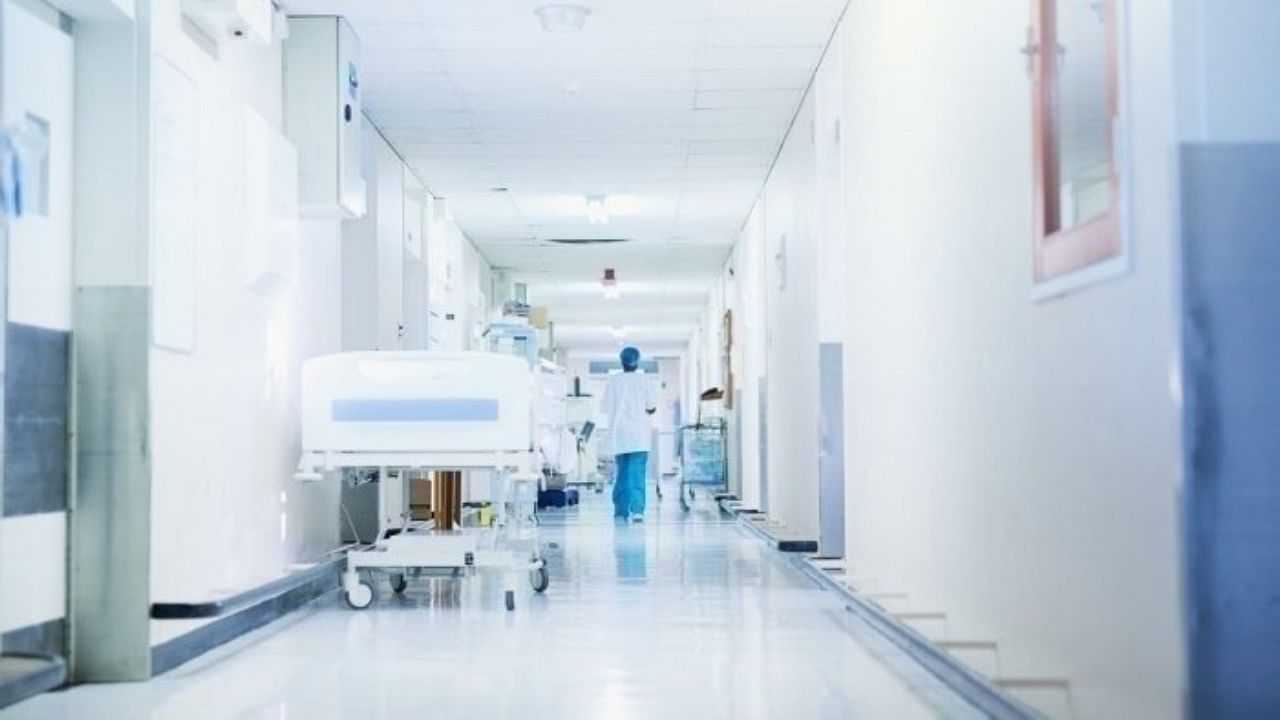
India's second Omicron variant patient, a 46-year-old government hospital anaesthesiologist on Saturday said that he is normal and free of any symptoms of the infection.
Speaking to media persons on a video call from the isolation ward at Bowring and Lady Curzon Hospital, the doctor said that he was 100 per cent normal and feeling fit enough to play a game of badminton!
Allaying the fears among the public about the infection from the new variant, the recovering doctor clarified that he has not experienced anything life-threatening so far even after 13-days since the onset of Covid symptoms.
"I don't have a single symptom as of now," he said. Putting speculation on his travel history to rest, the anaesthetist said he had not gone anywhere out of Bengaluru. "If I left the hospital (where he works), I went straight home. If I left home, I went straight to the hospital. That's all. I had completely avoided going outside as much as possible. In fact, I neither have time to go out nor have any interest to go out during this (pandemic) time," he said.
Explaining about the testing and recovery phase, the doctor said, "By 21 November evening I had body pains, mild fever and chills." However, he was eager to point out that he did not have the manifestation of typical Covid symptoms like cold or cough. Adding further, "On November 22 morning, since I was not feeling well, I tested myself with both the RAT (Rapid Antigen Test) and RT-PCR test. While the RAT test results immediately showed positive for Covid infection, the RT-PCR test revealed the same by evening. Ever since I developed symptoms, on 22 November, I isolated myself in the room and was stay put behind the closed door," he said.
The doctor pointed out that he didn't even have a headache. "My main symptoms initially were body pain and chills. I had a mild fever of 100 Fahrenheit. I didn't have any other symptoms. At home, we live with my parents in the same building. I did not want to take risks and that is why I got the test done," he said. For three days, the doctor took tablets--paracetamol, multivitamins, and started himself on antibiotics on his own and felt fine. "My symptoms were manageable. I had body pain but I've never had a cough or cold. I had never even been to a party. I'm surprised how I got the Omicron variant," he said.
One hour at a medical conference
Pointing to revelations that he had been to a medical conference at a star hotel, the doctor clarified that he was there at the international event only for an hour on the night of 20th November--a day prior to the onset of symptoms.
"On November 20, I had been to a medical conference at a hotel but I was late. I reached the venue only by 9.30 pm since I had to finish some work at home. By 10.30 pm I left the hotel. That's just one hour. I don't know how the incubation period can be just 24 hours: from Saturday to Sunday. Any virus takes at least three to four days to incubate after entering the body. But this is a new variant and I don't have much information," he explained to reporters, at Bowring on Saturday morning.
He said that he had no symptoms before going to the conference. "If I had had symptoms before that I wouldn't even go. Only after I went there and came back, my symptoms started," he said. The doctor also said there were no delegates from 'outside' (international) at the conference. "They had participated online. All in-person participants were local. I didn't go to any place of worship or temple as is being alleged. Studies on the Omicron variant are going on in other countries. Even in our country, we have just detected one case," he added.
Pulse rate remained normal
"My personal experience is that it is not life-threatening. Symptoms include body pain, fever and chills. Apart from that, I experienced no other symptoms like breathlessness. My oxygen saturation also did not dip. Even fever was very minimal. There is no need to feel panicky or scared," he said.
He explained that the pulse rate of a patient increases when there is an infection in the body. Any ordinary fever, viral fever or infection causes the pulse rate to increase. "But my pulse rate never crossed more than 100," he said.
Source unknown
"I myself don't know how I got this infection. My friends and colleagues are also saying, 'You take so much precaution even then you've got it. We're surprised.' I have absolutely no travel history. I want to say this again: I don't know where I contracted Omicron," he said.
In his message to the public, he said, there is no need to fear." Like with the previous variant (delta), there are no complications with this. This is my experience. They're saying the most infected are young adults below 40 years of age. I still don't feel there's anything to feel scared about," he said.
He pointed out that the virus may have mutated here in the state itself and advocated for more testing. "Maybe if we test more, we'll get to know more. Henceforth, if we regularly test, definitely we can be more aware of this variant," he said. On a heartening and reassuring note, he signed off saying, "I'm 100 per cent normal, near-normal, I can walk by myself. I'm good enough to play badminton."
His treating physician Dr Madhumathi R, Professor of Medicine at Bowring, said, "He had already taken monoclonal antibody therapy. If it is taken within five days of exposure it is definitely beneficial. Usually, we use the therapy for risk factors but professionals like doctors take it because they're at more risk (by dint of their work). Since he had taken the antibodies treatment, the progression of the disease in him is not severe. He came only on the eighth day and they haven't progressed with the severity of the disease despite today being day 13."
Watch the latest DH videos:
